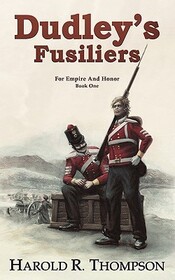While I've read better novels about the Crimean War, this one was still a good read. It's the first book in a trilogy. I now have the second on my WL.
Due to heart break (it's always a woman's fault), a scholar joins the British army of the 1850s as a recruit. Probably not the smartest move he could make. But then I voluntarily joined the Marines, so I shouldn't judge him. He wants to be a hero and lead men in combat. Like me, he probably watched too many John Wayne movies. Because he can actually read, and so many NCOs are killed, he finally gets his wish. He makes friends with other soldiers, and loses some too. I was impressed the author had him understanding why in training his NCOs make it extremely hard for him. They knew combat was worse.
The author also makes a point of showing how the French took better care of their troops than the British did. The French actually cared if their troops ate decently. This was factual. As an NCO Dudley is constantly taking out working parties to find fire wood, as the men are cold. During the Crimean War, British ships actually sat off shore for months doing nothing. When they could have been making regular trips to Turkey to load firewood. Just another good example of how the British army treated its enlisted personnel poorly back then. Meanwhile, some senior officers had their personal yachts off shore loaded with the best food and wines. But this wasn't mentioned in the book.
When Dudley leaves the replacement center and joins his regiment, his battalion commanding officer is identified as Lieutenant Colonel Freemantle. This made me pause, as I felt I'd heard that name before, but couldn't remember in what regard. And I had that thought every time Freemantle was mentioned. It wasn't until the end of the book I made the connection. Several years after the Crimean War, in 1863, British Lieutenant Colonel Freemantle made a tour of the Confederacy and was an observer with the Army of Northern Virginia at the Battle of Gettysburg. I've even read his book on that experience.
But, if you read Arthur Freemantle's page on Wikipedia, apparently he did not serve in the Crimean War.
Due to heart break (it's always a woman's fault), a scholar joins the British army of the 1850s as a recruit. Probably not the smartest move he could make. But then I voluntarily joined the Marines, so I shouldn't judge him. He wants to be a hero and lead men in combat. Like me, he probably watched too many John Wayne movies. Because he can actually read, and so many NCOs are killed, he finally gets his wish. He makes friends with other soldiers, and loses some too. I was impressed the author had him understanding why in training his NCOs make it extremely hard for him. They knew combat was worse.
The author also makes a point of showing how the French took better care of their troops than the British did. The French actually cared if their troops ate decently. This was factual. As an NCO Dudley is constantly taking out working parties to find fire wood, as the men are cold. During the Crimean War, British ships actually sat off shore for months doing nothing. When they could have been making regular trips to Turkey to load firewood. Just another good example of how the British army treated its enlisted personnel poorly back then. Meanwhile, some senior officers had their personal yachts off shore loaded with the best food and wines. But this wasn't mentioned in the book.
When Dudley leaves the replacement center and joins his regiment, his battalion commanding officer is identified as Lieutenant Colonel Freemantle. This made me pause, as I felt I'd heard that name before, but couldn't remember in what regard. And I had that thought every time Freemantle was mentioned. It wasn't until the end of the book I made the connection. Several years after the Crimean War, in 1863, British Lieutenant Colonel Freemantle made a tour of the Confederacy and was an observer with the Army of Northern Virginia at the Battle of Gettysburg. I've even read his book on that experience.
But, if you read Arthur Freemantle's page on Wikipedia, apparently he did not serve in the Crimean War.




